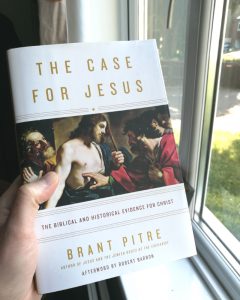As a church we are constantly being drawn deeper into our relationship and understanding of God, whilst looking outward into our community and the wider world.
We encourage you to check out sermons from Sunday services, re-watch services on our YouTube Channel and return to this page to see new ways we’re exploring our faith.
Courses/Groups
During COVID Lockdown in 2020 we explored a book via Zoom which explored the Gospels from a historical persepective: Brant Pitre’s “The Case for Jesus”.
A set of questions we used as a parish covering the book as a 7 week book club:
Exploring Brant Pitre’s “The Case for Jesus” (Penguin: New York 2016)
Week 1: Chapters 1-3
- What did you think of Brant’s style of writing?
- What did you think about the first 3 chapters? Did you learn anything new?
- What gives you confidence that the gospels were never anonymous, but were written by four then-famous Christians?
- Who does Pitre argue that Matthew, Mark, Luke and John are? (more on these arguments in chapter 4 as we explore external evidence for these attributions)
- So far, is it plausible for these attributions (if not likely)?
Week 2: Chapters 4-5
- Had you heard of the ‘Church Fathers’ before? If you had, what was new to you?
- How persuasive do you find his arguments as to the authors of Matthew, Mark, Luke & John?
- Why does do you think the Bible contains four Gospels and not more, or less?
Week 3: Chapters 6-7
- What is your go-to genre when you want to read a good book?
- Pitre argues that the Gospels are ancient biographies. Are you convinced by his argument?
- What is your favourite snapshot/event from the Gospel, and why is it your favourite?
- If the Gospels were written by modern biography writers, what do you wish was included in the description of Jesus and his background?
- What do you think of Pitre’s dating argument – putting the Synoptic Gospels before 70AD (for the Gospel of John presumably Pitre would consider this to be dated closer to 100AD)
Week 4: Chapter 8
- What were the expectations about the Jewish Messiah in the 1st Century? What would they do, or be like?
- Have you ever wondered why Jesus calls himself the ‘Son of Man’?
- What was new to you in this chapter?
- What do we need the Messiah for today? What do we need saving from?
Week 5: Chapter 9
- What miracle recorded in the Gospels moves you the most?
- Marvel/DC heroes can often control things like water or energy: How is Jesus’ control different?
- What miracles didn’t Jesus do, that you wish He had?
Week 6: Chapters 10-11
- Had you noticed that Jesus at various points in his ministry tells people and spirits not to reveal his identity as the Messiah? Why do you think he did this?
- How do you like to be taught? Pitre notes that the crowds around Jesus “delighted in being taught by … parables, riddles, and questions”… what do you think of Jesus’ pedagogical style in the Gospels?
- What Jesus says reveals his identity. What for you are some of the most powerful things Jesus said?
- Jesus quotes from a Psalm when he is hung on the Cross. Do you have any “go to” psalms that you know well?
Week 7: Chapters 12-13
- The Bible and our faith teach us that Jesus was resurrected. But what does ‘resurrection’ mean?
- What evidence do we have that Jesus was ‘resurrected’?
- What was new in chapter 12?
- Pages 193 & 194 summarize what has been argued across in the book. What part of the argument did you find most interesting? What was new to you? Was there any part you were less convinced by?
- Finally, Pitre concludes that although belief in Jesus as the Son of God is rational and has lots of supportive evidence, faith is a gift of God and cannot be forced on anyone. Mystery and God’s grace has to play a part. What might this mean for our evangelism (sharing our faith) today?
